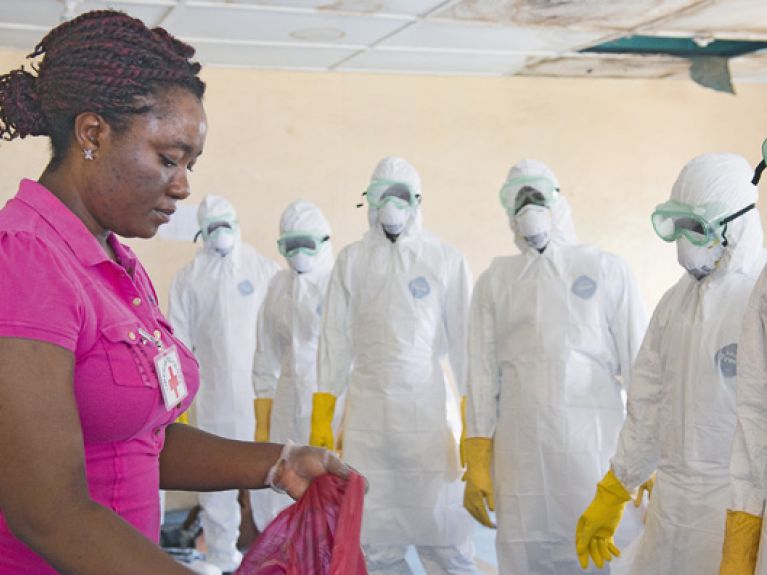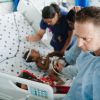All set to battle epidemics
In future, the EU will use the European Medical Corps to combat highly infectious diseases like Ebola. Rapid reaction teams are designed to contain epidemics in the early stages.

Twelve orange-coloured crates, two grey ones and a blue box are ready to save lives when the next epidemic occurs. The 15 sturdy water- and dust-proof containers are still at a storage facility belonging to the Bundeswehr Institute of Microbiology in Munich. They contain around 500 kilograms of laboratory equipment worth some 200,000 euros. “If an epidemic breaks out anywhere in the world, our experts can grab the mobile laboratory, jump on a plane and carry out the first tests within hours of arriving at the crisis area,” says Stephan Günther, head of the Department of Virology at the Bernhard Nocht Institute for Tropical Medicine in Hamburg. Together with the German Red Cross (DRK) and the Federal Agency for Technical Relief (THW), Germany’s biggest institute for tropical medicine is part of the European Medical Corps, which was founded in February 2015. Created at the initiative of Federal Foreign Minister Frank-Walter Steinmeier and former French Foreign Minister Laurent Fabius, the logistical and medical rapid reaction force is in future designed to help contain epidemics in the early stages. The initially hesitant and uncoordinated response to the Ebola epidemic in 2014 demonstrated how ill-prepared the international community was to tackle a disease that was spreading quickly across national borders.
“We reacted, but we had to admit that we were too late. Too late at least for the more than 11,000 men, women and children who have fallen victim to this scourge,” said Steinmeier, commenting on the Ebola epidemic at the European Medical Corps’s inauguration event in Brussels. “We cannot allow another health crisis to find us as underprepared. We cannot bring the victims back to life. However, we can prevent such a disaster from recurring because it takes us months to act,” the Foreign Minister said. That’s why Steinmeier and his then French counterpart resolved to create a European pool of medical and logistics experts, initially called White Helmets. They are ready to go wherever they are needed at a moment’s notice and if possible nip epidemics in the bud.
Besides Germany, France, Spain, Belgium, the Netherlands, Sweden, Norway, Finland and the Czech Republic are all participating in the project, which is financed by national contributions and EU funding. “It underscores the EU’s effectiveness, especially in complex crisis situations,” said Steinmeier.
With the DRK providing an isolation hospital to treat highly infectious patients, logistical support from the THW and the Bernhard Nocht Institute‘s mobile laboratory, Germany will be making the biggest contribution to the European Medical Corps. “There are many highly infectious diseases that even the most experienced doctors cannot diagnose without a laboratory. But it’s precisely in regions where epidemics regularly break out that there are often no or too few functional laboratories. That’s why our mobile lab can help to identify dangerous diseases quickly and unequivocally and stop them from spreading,” says Stephan Günther, whose responsibilities at the Bernhard Nocht Institute include cooperation with the World Health Organization (WHO).
European Commissioner for Humanitarian Aid and Crisis Management Christos Stylianides emphasises the fast response time of the newly created team of experts. “With the European Medical Corps, we know even before a crisis breaks out exactly what resources are available. We know how many mobile hospitals, how many laboratory facilities and how many emergency medical teams we can deploy. And that’s precisely what was lacking during the Ebola crisis. The new medical crisis mechanism will enable Europe to respond faster and more effectively when needed,” says Stylianides.
To ensure that everything runs swiftly and smoothly when emergencies occur, special training courses and workshops are held to prepare all participants for their missions. They also receive intensive training in international cooperation.
Experts from the THW will be among those taking part in the training courses and subsequent assignments. Even at remote locations and under difficult climatic conditions, they can quickly provide technical support to treatment centres, set up decontamination sluices, secure the power supply, treat drinking water and equip workshops for repairing vehicles and generators. “Our members form a sort of highly skilled, mobile team of caretakers. Our database gives us access to around 200 fully vaccinated and optimally prepared experts who can be deployed within hours,” says Susanne Wacht, who works in the THW’s foreign department. She looks forward to working together with German and European medical and logistics experts. “Since all partners know in advance exactly who has which capacities, we are able to complement each other perfectly and react much faster in an emergency. The time we gain will help save lives.” ▪

